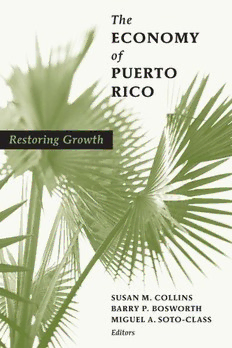
Economy of Puerto Rico PDF
622 Pages·2006·2.565 MB·English
Most books are stored in the elastic cloud where traffic is expensive. For this reason, we have a limit on daily download.
Preview Economy of Puerto Rico
Description:
A territory of the United States, Puerto Rico operates under U.S. legal, monetary, security and tariff systems. Despite sharing in these and other key U.S. institutions, Puerto Rico has experienced economic stagnation and large scale unemployment since the 1970s. The island’s living standards are low by U.S. standards, with a per capita income only half that of Mississippi, the poorest state. While many studies have analyzed the fiscal implications of Puerto Rico’s political relationship with the United States, little research has focused broadly on the island’s economic experience or assessed its growth prospects. In this innovative new book, economists from U.S. and Puerto Rican institutions address a range of major policy issues affecting the island’s economic development. To frame the current situation, the contributors begin by assessing Puerto Rico’s past experience with various growth policies. They then analyze several reforms and new initiatives in labor, education, entrepreneurship, fiscal policy, migration, trade, and financing development, which they incorporate into a proposed strategy for jumpstarting Puerto Rican economic growth.
See more
The list of books you might like
Most books are stored in the elastic cloud where traffic is expensive. For this reason, we have a limit on daily download.
